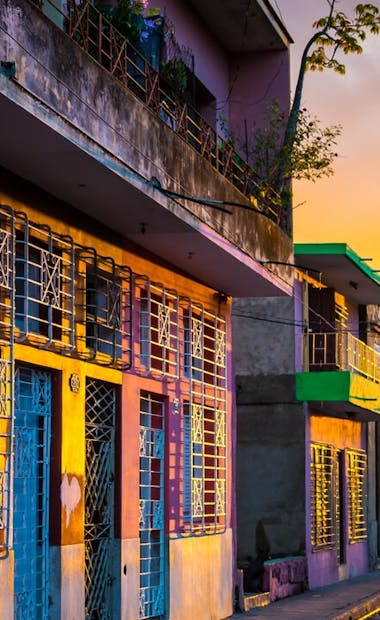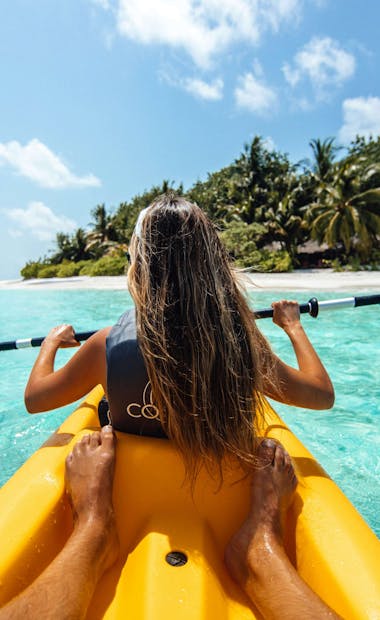
Cuba Tours
Vintage cars, Caribbean beaches, majestic colonial towns and incredible music
Popular tours
- Save26%
 View Tour
View TourPremium Cuba - 9 Days
- Havana to Havana
- Age group: 15 - 99
- Max group size: 12
Was:£2,680From£1,990 - Save26%
 View Tour
View TourCuban Rhythms: Beachfronts & Havana Vibes - 8 Days
- Havana to Havana
- Age group: 18 - 39
- Max group size: 16
Was:£869From£645 - Save26%
 View Tour
View TourCuba Explorer - 9 Days
- Havana to Havana
- Age group: 12 - 100
- Max group size: 16
Was:£1,319From£979 - Save21%
 View Tour
View TourBeautiful Cuba - 8 Days
- Havana to Havana
- Age group: 15 - 99
- Max group size: 12
Was:£1,180From£935 - Save21%
 View Tour
View TourTreasures of Cuba - 15 Days
- Havana to Havana
- Age group: 12 - 100
- Max group size: 16
Was:£1,549From£1,227 - Save26%
 View Tour
View TourCycle Cuba: West - 7 Days
- Havana to Havana
- Age group: 15 - 99
- Max group size: 16
Was:£995From£739
Cuba Tours
Discover the Enchanting Allure of Cuba: Unforgettable Cuba Tours and Holidays
Welcome to Cuba, the captivating Caribbean gem that enchants visitors with its vibrant culture, breathtaking landscapes, and rich history. A land of passionate music, rhythmic dances, and timeless charm, Cuba is an irresistible destination that promises an unforgettable experience. Join us on an extraordinary Cuba tour or holiday, where you'll immerse yourself in the island's vibrant spirit and create memories to last a lifetime.
Cuba Tours: Embark on an Unforgettable Adventure
Embarking on a Cuba tour is like stepping into a time capsule, where the past and present intertwine to create a unique tapestry. Wander through the cobblestone streets of Havana, Cuba's colorful capital, and let the nostalgic architecture and vintage cars transport you to a bygone era. Explore the fascinating historic sites, such as the UNESCO-listed Old Havana, where you'll encounter magnificent colonial buildings and bustling plazas, brimming with local life.
Beyond Havana, Cuba offers an array of natural wonders to behold. Travel to the serene Viñales Valley, a UNESCO World Heritage Site, and be mesmerized by the striking limestone karsts that rise majestically from the verdant tobacco fields. Take a journey to the captivating Zapata Peninsula, home to the Ciénaga de Zapata National Park, where pristine wetlands and an incredible array of wildlife await. Dive into crystal-clear waters and explore the vibrant coral reefs that surround the island, teeming with colorful marine life.
Cuba Holidays: A Fusion of Culture, Cuisine, and Celebration
Immerse yourself in the soul-stirring rhythms of Cuban music as you dance to the infectious beats of salsa, son, and rumba. From lively street corners to cozy local venues, the music is an ever-present soundtrack that will have you swaying to its irresistible melodies. Delight in the passionate performances of talented musicians and experience the vibrant nightlife that pulses through the streets of Havana and other lively cities.
Indulge in the tantalizing flavors of Cuban cuisine, a fusion of African, Spanish, and Caribbean influences. Savor succulent roast pork, savory black beans, and crispy plantains, and wash it all down with a refreshing mojito or a sip of world-renowned Cuban rum. From street food vendors to elegant paladares, Cuba offers a culinary adventure that will tantalize your taste buds and leave you craving for more.
As you plan your Cuba holiday, don't miss the chance to witness the country's colorful celebrations and traditions. Experience the exhilarating Carnival in Santiago de Cuba, where vibrant parades, lively music, and exuberant costumes fill the streets with joy. Immerse yourself in the soulful melodies of the Buena Vista Social Club, or witness the electrifying energy of a live performance by the world-famous Tropicana Cabaret.
Book Your Unforgettable Cuba Tour or Holiday Today
With its vibrant culture, stunning landscapes, and warm-hearted people, Cuba is a destination that will capture your imagination and leave you longing for more. Whether you choose to explore the historic streets of Havana, wander through breathtaking natural wonders, or immerse yourself in the island's vibrant music and cuisine, a Cuba tour or holiday promises an unforgettable adventure.
Book your Cuba tour or holiday today and embark on a journey of a lifetime. Experience the magic of this captivating island, where every corner tells a story and every moment is filled with joy. Let us guide you through the wonders of Cuba, where the past dances with the present and memories are made to treasure forever.
When is the best time to visit Cuba?
The best time to visit Cuba depends on your preferences and what you wish to experience during your trip. Cuba has a tropical climate, characterized by warm temperatures and distinct wet and dry seasons. Here's a breakdown of the different seasons to help you choose the best time for your visit:
Dry Season (December to May): This is generally considered the best time to visit Cuba. The weather is pleasantly warm, with lower humidity and minimal rainfall. It's an ideal time for beach lovers and outdoor activities. The peak tourist season falls between December and February, so expect larger crowds and higher prices during this period. March to May offers a more relaxed atmosphere while still enjoying the favorable weather.
Wet Season (June to November): This period experiences higher temperatures, humidity, and occasional rainfall. The wet season includes the official hurricane season (June to November), although the highest risk is from August to October. Despite the rain, there are still plenty of sunny days, and this time of year offers fewer tourists, lower prices, and a greener landscape. If you don't mind occasional showers and want to experience Cuba with fewer crowds, the wet season can be a good option.
It's worth noting that Cuba's weather can be unpredictable, and even during the dry season, there may be sporadic showers. Additionally, the country is large, so climate variations exist between regions. Eastern regions tend to be drier and hotter, while western regions receive more rainfall.
Ultimately, the best time to visit Cuba depends on your priorities. If you prefer fewer crowds and lower prices, the wet season may be suitable. However, if you want optimal beach weather and a vibrant atmosphere, consider visiting during the dry season. Regardless of the season, Cuba's charm and cultural richness are sure to make your visit a memorable one.
Will I need a visa to travel to Cuba?
Yes, most travellers will need a visa to travel to Cuba. The specific visa requirements depend on your nationality and the purpose of your visit. Here are some general guidelines:
Tourist Visa: If you plan to visit Cuba for tourism purposes, you will typically need a tourist visa, also known as a tourist card or "Tarjeta del Turista." This visa allows you to stay in Cuba for a specific period, usually up to 30 days, which can be extended for an additional 30 days while in Cuba. Tourist visas are usually issued by Cuban consulates or authorised travel agencies.
Other Types of Visas: If you are traveling to Cuba for reasons other than tourism, such as for business, journalism, education, or visiting family, you may require a different type of visa. The requirements and application process for these visas vary, and it's advisable to check with the Cuban embassy or consulate in your country for specific information.
Tourist Card for Specific Nationalities: Some countries have agreements with Cuba that allow their citizens to enter with a tourist card rather than a visa. For example, citizens of certain European Union countries, Canada, Mexico, and many others can obtain a tourist card directly from travel agencies, airlines, or Cuban consulates. These cards usually cover a stay of up to 30 days and can be extended while in Cuba.
It's essential to check the visa requirements well in advance of your travel dates to ensure you have the necessary documentation. You may also need to show proof of travel insurance, a return ticket, and sufficient funds for your stay in Cuba. The specific requirements can vary, so it's advisable to consult the official website of the Cuban embassy or consulate in your country or seek assistance from a travel agency specialising in Cuba travel.
Travellers from most countries will need a “tourist card” to visit Cuba as a tourist. You can often usually buy with your airline at the airport but we recommend you check with your airline before. Guidelines can vary so we recommending checking FCO advice for correct and up to date information.
What are the must see destinations in Cuba?
Cuba is brimming with captivating destinations that offer unique experiences and cultural treasures. Here are some must-see destinations in Cuba:
Havana: The vibrant capital city of Havana is a must-visit destination. Explore the charming streets of Old Havana (Habana Vieja), a UNESCO World Heritage Site, where you'll find colorful colonial architecture, lively plazas, and historical landmarks like the Castillo de la Real Fuerza and the Cathedral of Havana. Don't miss the famous Malecón, a seaside promenade where locals gather, and immerse yourself in the lively music scene and captivating nightlife.
Viñales Valley: Located in the western part of Cuba, the Viñales Valley is a stunning UNESCO World Heritage Site known for its lush tobacco fields, dramatic limestone formations (mogotes), and traditional rural life. Take a leisurely horseback ride or hike through the valley, visit a tobacco plantation to learn about the cigar-making process, and enjoy the breathtaking natural beauty of this picturesque region.
Trinidad: Step back in time as you explore Trinidad, a well-preserved colonial town that feels frozen in the 19th century. Cobblestone streets, pastel-colored houses, and beautiful squares create a charming ambiance. Visit the Plaza Mayor, the heart of the town, and admire the colonial architecture. Don't miss the Museo Romántico, a museum housed in a former mansion, showcasing the opulent lifestyle of the sugar barons. Nearby, you can also visit the beautiful Playa Ancón, a pristine beach with crystal-clear waters.
Varadero: For those seeking sun, sand, and relaxation, Varadero is a paradise. Located on the Hicacos Peninsula, this famous beach resort town boasts miles of white sandy beaches, turquoise waters, and a wide range of all-inclusive resorts. Enjoy water sports, soak up the sun, or simply unwind in this tropical haven.
Santiago de Cuba: As the second-largest city in Cuba, Santiago de Cuba is known for its rich Afro-Caribbean culture and vibrant music scene. Visit the historic Castillo de San Pedro de la Roca, a UNESCO World Heritage Site overlooking the bay, and explore the picturesque streets of the city's historic center. Don't miss the lively Carnaval de Santiago de Cuba, one of the country's most famous celebrations.
Cienfuegos: Known as the "Pearl of the South," Cienfuegos is a charming coastal city with French influences. Stroll along the elegant Paseo del Prado, admire the neoclassical architecture, and visit the stunning Teatro Tomás Terry. Explore the beautiful Cienfuegos Bay, go snorkelling or diving in the nearby Guanaroca Lagoon, and take a boat trip to the pristine El Nicho Waterfalls.
These are just a few highlights of the many incredible destinations Cuba has to offer. Whether you're interested in history, natural beauty, or vibrant culture, Cuba will undoubtedly captivate you with its diverse attractions and warm hospitality.
What is the local currency in Cuba, and can I use credit cards?
The local currency in Cuba is the Cuban Convertible Peso (CUC). However, it's important to note that there are two currencies circulating in Cuba: the CUC and the Cuban Peso (CUP). The CUC is the currency typically used by tourists, while the CUP is the currency used by locals for everyday transactions. It's advisable for tourists to primarily use CUC for their expenses.
Regarding credit cards, Cuba has limited acceptance of international credit cards. While major credit cards such as Visa and Mastercard are accepted at some hotels, restaurants, and larger establishments in tourist areas, it's important to be prepared for the fact that credit card acceptance can be inconsistent and unreliable. Some establishments may only accept cash payments in CUC.
It's recommended to bring enough cash (preferably in CUC) to cover your expenses during your stay in Cuba. You can exchange foreign currency, such as US dollars, Euros, or British pounds, into CUC at banks or official exchange offices (CADECA). It's advisable to exchange your money at these authorised institutions to ensure you receive the official exchange rate. Keep in mind that there might be a commission fee for currency exchange transactions.
It's also worth noting that there is a 10% penalty fee when exchanging US dollars into CUC, so it may be more advantageous to bring another major currency to avoid this additional charge.
To ensure you have sufficient funds, it's recommended to plan your budget in advance and have a contingency for any unexpected expenses. It's wise to carry cash in smaller denominations, as obtaining change for larger bills can sometimes be challenging.
Lastly, it's essential to keep your cash and important documents secure during your travels in Cuba. Use hotel safes when available and be cautious of pickpocketing in crowded areas.
Overall, being prepared with sufficient cash and having a backup plan for payments will help ensure a smoother financial experience during your visit to Cuba.
Is Cuba a good destination for solo travellers?
Yes, Cuba can be a great destination for solo travellers. The island offers a unique and enriching experience for those exploring on their own. Here are some reasons why Cuba is a good destination for solo travellers:
Friendly and Hospitable Locals: Cubans are known for their warm hospitality and friendliness towards visitors. As a solo traveler, you can expect to encounter welcoming locals who are often willing to engage in conversation, offer recommendations, and share insights about their culture. Interacting with Cubans can provide a deeper understanding of the country and create memorable connections.
Safety: Cuba is generally considered a safe destination for travellers. The country has a relatively low crime rate, and tourists are generally welcomed and respected. Of course, it's always important to exercise standard precautions and stay aware of your surroundings, but solo travellers often find Cuba to be a secure and welcoming place to explore.
Cultural Immersion: Traveling solo allows you the freedom to immerse yourself fully in Cuba's rich cultural offerings. You can explore at your own pace, visit local markets, attend music and dance performances, and interact with locals without the constraints of group dynamics. Solo travel offers a unique opportunity to connect with the authentic spirit of Cuba and create a more personal and meaningful experience.
Flexibility and Independence: When traveling alone, you have the freedom to design your itinerary according to your interests and preferences. You can adapt your plans spontaneously, indulge in spontaneous detours, and fully embrace the serendipitous moments that often arise during solo travel. Whether you want to spend more time in a particular destination or explore off-the-beaten-path locations, Cuba allows you the flexibility to curate your own adventure.
Solo-Friendly Accommodation Options: Cuba offers a range of accommodation options suitable for solo travellers. From budget-friendly hostels and casa particulares (private homestays) to upscale hotels, you can find a comfortable place to stay that suits your preferences and budget. Casa particulares, in particular, provide an opportunity to connect with local families and fellow travellers, offering a more intimate and authentic experience.
While traveling solo in Cuba can be rewarding, it's always advisable to take standard safety precautions, such as informing someone of your travel plans, being cautious with your belongings, and staying informed about local customs and regulations. With proper preparation and an open mindset, solo travellers can embark on an enriching journey through Cuba, immersing themselves in its vibrant culture, captivating history, and breathtaking landscapes.
Is Cuba a good family holiday destination?
Cuba can indeed be a fantastic family holiday destination, offering a mix of captivating experiences for travellers of all ages. Here are several reasons why Cuba is a great choice for a family vacation:
Rich Cultural and Educational Experiences: Cuba's rich history, vibrant music, and unique cultural heritage provide excellent opportunities for families to learn and engage together. Explore the cobblestone streets of Old Havana, visit museums showcasing Cuba's fascinating past, and witness live music and dance performances. Kids can learn about the Spanish colonial era, the Cuban Revolution, and the Afro-Cuban influences that shape the country's culture.
Beautiful Beaches and Outdoor Activities: Cuba boasts stunning beaches with crystal-clear waters, making it an ideal destination for families seeking relaxation and outdoor activities. Popular beach resorts like Varadero offer a range of family-friendly amenities, water sports, and opportunities for snorkelling or diving. Additionally, Cuba's natural landscapes, such as the Viñales Valley and Topes de Collantes, provide opportunities for hiking, horseback riding, and exploring breathtaking scenery.
Family-Friendly Accommodation: Cuba offers various family-friendly accommodation options to suit different budgets. Many hotels and resorts provide amenities and activities specifically designed for children, including kids' clubs, pools, and entertainment programs. Another popular option is staying in casa particulares, where families can experience Cuban hospitality and have more flexibility in terms of meal options and space.
Safety and Welcoming Atmosphere: Cuba is generally considered a safe destination for travellers, including families. The locals are known for their warmth and friendliness towards children, and families are often welcomed with open arms. The country has a relatively low crime rate, making it a comfortable place for parents to explore with their children.
Wildlife and Nature Experiences: Cuba offers unique opportunities to encounter diverse wildlife and explore nature reserves. Visit the Zapata Peninsula, home to the Ciénaga de Zapata National Park, where you can spot crocodiles, colourful birds, and other fascinating creatures. Explore the Gardens of the Queen, a marine reserve renowned for its pristine coral reefs, where kids can discover the wonders of the underwater world through snorkelling or glass-bottom boat tours.
Festivals and Celebrations: Cuba's festive spirit is infectious, and families can immerse themselves in vibrant celebrations and festivals. From the lively Carnaval de Santiago de Cuba to the processions of the Feast of San Lázaro, there are numerous opportunities to witness Cuban traditions and experience the joyous atmosphere of these cultural events.
It's important to note that infrastructure and services in Cuba may differ from those in more developed tourist destinations. Therefore, it's advisable to plan and prepare accordingly, bring essential supplies, and have patience and flexibility during your family holiday.
Overall, Cuba offers a blend of educational, cultural, and outdoor experiences that can create lasting memories for families. By embracing the country's rich history, stunning landscapes, and warm hospitality, families can embark on a rewarding and unforgettable journey together.
Is Cuba a safe destination?
Cuba is generally considered a safe destination for travelers. The country has a relatively low crime rate compared to many other tourist destinations in the region. Cuban authorities prioritise the safety and well-being of tourists, and incidents of violent crime targeting visitors are rare.
However, it's always important to exercise standard safety precautions while traveling, regardless of the destination. Here are some tips to ensure a safe and enjoyable trip to Cuba:
Stay aware of your surroundings: Like in any unfamiliar place, it's essential to be mindful of your surroundings, especially in crowded areas and tourist hotspots. Keep an eye on your belongings and be cautious of pickpocketing or petty theft, particularly in busy markets or public transportation.
Use official transportation and licensed taxis: When using transportation, it's advisable to use official taxis or those recommended by your accommodation. Licensed taxis have identification markings and are generally considered safer than unlicensed or unofficial ones.
Secure your valuables: Keep your important documents, cash, and valuables secure at all times. Use hotel safes when available and avoid displaying expensive items or large amounts of cash in public.
Take care of your health: Cuba is generally a safe country in terms of health. However, it's advisable to take necessary precautions, such as using mosquito repellent to protect against mosquito-borne illnesses like dengue and Zika. Stay hydrated, follow good hygiene practices, and consider travel insurance that covers medical emergencies.
Respect local laws and customs: Familiarise yourself with the local laws, regulations, and customs of Cuba to avoid any legal or cultural misunderstandings. It's important to respect local traditions, dress modestly when visiting religious sites, and follow any instructions or restrictions given by authorities.
Use reputable exchange services: When exchanging money, use authorised institutions such as banks or official exchange offices (CADECA) to ensure you receive the official exchange rate and avoid potential scams.
As with any travel destination, it's advisable to stay informed about the current situation in Cuba before your trip. Check travel advisories issued by your country's government for any specific information or updates regarding safety concerns.
By taking standard safety precautions, being respectful of local customs, and using common sense, visitors can have a safe and enjoyable experience in Cuba. The warm hospitality and vibrant culture of the country make it a welcoming destination for travellers from around the world.
Will I require any vaccinations to travel to Cuba?
Yes, certain vaccinations are recommended for travelers visiting Cuba. It's important to consult with a healthcare professional or a travel medicine clinic well in advance of your trip to determine the specific vaccinations you may need based on your medical history, current health status, and the areas you plan to visit in Cuba. Here are some common vaccinations recommended for travelers to Cuba:
Routine Vaccinations: Ensure that you are up to date on routine vaccinations, including measles-mumps-rubella (MMR), diphtheria-tetanus-pertussis (DTaP), varicella (chickenpox), polio, and the yearly influenza vaccine.
Hepatitis A: Hepatitis A is recommended for most travelers to Cuba as the disease can be contracted through contaminated food or water. The vaccine provides long-term protection against this viral infection.
Typhoid: Typhoid vaccination is recommended for travelers who may consume food or drinks that have a higher risk of contamination. This includes street food or meals in local establishments with questionable hygiene practices.
Hepatitis B: Hepatitis B vaccination is recommended for travelers who may have intimate contact with the local population, require medical treatments or procedures, or engage in activities that may expose them to blood or bodily fluids.
Rabies: If you plan to have significant contact with animals or participate in outdoor activities that may bring you into close proximity with wildlife, a rabies vaccination may be considered. However, it's important to remember that the vaccine does not eliminate the need for immediate medical attention in the event of an animal bite or scratch.
Other Vaccinations: Depending on the duration and nature of your visit, as well as your personal health considerations, your healthcare professional may recommend additional vaccinations such as meningococcal, tuberculosis (TB), or others.
Remember that vaccination requirements and recommendations can change, so it's important to consult with a healthcare professional or travel medicine clinic closer to your travel date to ensure you have the most up-to-date information and personalised advice based on your specific circumstances.
In addition to vaccinations, it's also recommended to take preventive measures to protect against insect bites, practice good hygiene, and ensure safe food and water consumption during your stay in Cuba.
How does the rooming work on tours?
Small group tours in Cuba typically involve a set itinerary where you travel with a group of fellow travellers and a tour leader/guide. Accommodation arrangements vary depending on the specific tour you choose. Here are some common aspects of rooming arrangements on small group tours:
Shared Rooms: In order to promote camaraderie and facilitate interaction among group members, most tours arrange shared accommodation. This means you will be paired with another member of the same gender from the group to share a room. Roommates may sometimes change periodically throughout the tour.
Single Supplement: If you prefer to have your own room and privacy, you may have the option to pay a single supplement fee. This additional fee allows you to have your own room for the duration of the tour. However, please note that single supplements can vary in cost and availability.
Roommate Matching: Tour operators usually offer roommate matching services, where they try to pair you with a suitable roommate based on your preferences, such as age range. This can help ensure compatibility and a more enjoyable experience for all participants.
Rooming Preferences: When booking your small group tour, it's important to communicate your rooming preferences to the tour operator. If you have specific requirements or preferences, such as sharing with a friend or a specific roommate request, it's advisable to inform the tour operator during the booking process.
It's important to carefully read the tour details and inclusions provided by the tour operator to understand their specific rooming policies. If having your own room is a priority, make sure to inquire about the availability of single supplements and any associated costs before booking your tour.
Keep in mind that while sharing a room with a fellow traveller can be a great way to meet new people and build connections, having your own room provides more privacy and flexibility. Consider your preferences and the dynamics of the tour when deciding whether to opt for a shared room or pay for a single supplement.
Remember to communicate your needs and preferences clearly with the tour operator during the booking process to ensure a comfortable and enjoyable accommodation experience on your small group tour in Cuba.
What is the food like in Cuba?
Cuban cuisine is a delightful fusion of flavours influenced by Spanish, African, and Caribbean culinary traditions. While the food in Cuba may not be as internationally renowned as some other cuisines, it offers its own unique charm and distinct dishes. Here's an overview of the food in Cuba:
Rice and Beans: Rice and beans are staples in Cuban cuisine, often served together as Moros y Cristianos. The rice is cooked with black beans and seasoned with spices such as garlic, cumin, and bay leaves. It's a flavourful and filling dish that accompanies many meals.
Ropa Vieja: Ropa Vieja, meaning "old clothes" in Spanish, is a classic Cuban dish made from shredded beef stewed with onions, garlic, bell peppers, tomatoes, and spices. It's typically served with rice and plantains.
Lechón Asado: Lechón Asado is a succulent roasted pork dish, usually marinated in a blend of citrus juices, garlic, and spices before being slow-cooked until tender. It's a popular choice for festive occasions and is often accompanied by rice, beans, and yuca.
Tostones: Tostones are twice-fried plantains, a type of banana-like fruit. They are sliced, fried until crispy, flattened, and then fried again. Tostones are often served as a side dish or as a snack and can be enjoyed with a dipping sauce or salsa.
Cubano Sandwich: The Cubano sandwich is a famous Cuban creation. It features roasted pork, ham, Swiss cheese, pickles, and mustard, pressed between Cuban bread. It's a flavourful and hearty sandwich that is a popular street food option.
Yuca con Mojo: Yuca, also known as cassava, is a starchy root vegetable commonly used in Cuban cuisine. It is often boiled or fried and served with a garlic and citrus sauce called mojo. Yuca con Mojo makes for a tasty and comforting side dish.
Seafood: Given its island location, Cuba offers an abundance of fresh seafood. Popular seafood dishes include grilled fish, lobster, shrimp, and octopus, often marinated or seasoned with garlic, lime, and spices. Coastal areas and fishing villages are particularly known for their seafood specialties.
Tropical Fruits: Cuba's tropical climate provides an abundance of delicious fruits, such as mangoes, pineapples, papayas, guavas, and bananas. These fruits are commonly enjoyed fresh, in fruit salads, or as juice.
When dining in Cuba, you'll find a variety of restaurants ranging from paladares (privately-owned restaurants often located in people's homes) to state-run establishments. Paladares offer a more diverse and creative menu, while state-run restaurants often serve traditional Cuban dishes.
It's worth noting that the availability of ingredients and culinary options may vary outside major tourist areas. Vegetarian and vegan options can be limited, but with some creativity, it's still possible to find satisfying meals.
Overall, Cuban cuisine offers a mix of hearty, flavourful dishes that reflect the country's cultural heritage and local ingredients. Exploring the local food scene can be a delightful adventure, allowing you to savour the flavours and experience the culinary traditions of this vibrant island nation.
Can I drink the tap water in Cuba?
It is generally not recommended to drink tap water in Cuba. The tap water in Cuba may contain microorganisms and impurities that can cause stomach discomfort or illness, especially for visitors who are not accustomed to the local water supply. To stay safe and avoid potential health issues, it is best to rely on bottled water or purified water sources during your stay in Cuba.
When purchasing bottled water, ensure that the seal is intact and the brand is reputable. Bottled water is widely available in hotels, restaurants, and stores throughout the country. It's a good idea to carry a reusable water bottle and refill it with purified or bottled water to stay hydrated.
In addition to drinking water, it's important to be cautious when consuming beverages with ice or eating raw fruits and vegetables that may have been washed with tap water. Stick to cooked foods, peeled fruits, and vegetables that have been properly cooked or washed with purified water.
It's worth noting that some accommodations, particularly higher-end hotels, may have their own water purification systems and offer safe drinking water. If you're unsure about the water quality at your specific accommodation, it's best to confirm with the hotel staff.
By taking precautions and avoiding tap water, you can minimise the risk of waterborne illnesses and enjoy a healthy and pleasant trip to Cuba.
Are there any cultural norms in Cuba I should follow?
Yes, Cuba has its own unique cultural norms and customs that visitors should be aware of and respect. By familiarizing yourself with these cultural norms, you can enhance your experience and show appreciation for the local culture. Here are some key cultural norms in Cuba:
Greetings and Respect: Cubans generally greet each other with a handshake or a kiss on the cheek, even between acquaintances. It is polite to greet people with a warm "Hola" (hello) or "Buenos días" (good morning) when entering a room or engaging in conversation. Showing respect to elders and authority figures is highly valued in Cuban culture.
Personal Space and Physical Contact: Cubans tend to be comfortable with physical proximity and may stand closer during conversations compared to some other cultures. However, it is still important to be mindful of personal space and follow the cues of the person you are interacting with.
Politeness and Courtesy: Politeness and courtesy are highly regarded in Cuban culture. Use "por favor" (please) and "gracias" (thank you) when requesting assistance or expressing gratitude. Being polite and patient can go a long way in interactions with locals.
Dress Code: While Cuba has a relaxed atmosphere, it is advisable to dress modestly and respectfully, especially when visiting religious sites or government buildings. Revealing or provocative clothing may be considered inappropriate in certain contexts.
Tipping: Tipping is customary in Cuba, particularly in the tourism industry. It is common to leave a small tip for waitstaff, tour guides, drivers, and other service providers. The amount can vary, but leaving 10% of the bill as a tip is generally appreciated.
Socializing and Friendliness: Cubans are known for their friendliness and sociability. Engage in conversations, be open to meeting new people, and embrace the opportunity to interact with locals. It's common to strike up conversations with strangers and exchange pleasantries.
Music and Dance: Music is deeply ingrained in Cuban culture, and dance is a popular form of expression. Don't be surprised if you come across impromptu street performances or lively music venues. Embrace the rhythm and enjoy the vibrant music and dance scene that Cuba has to offer.
Photography Etiquette: While photography is generally allowed in public spaces, it's courteous to ask for permission before taking someone's photo, particularly if they are the main subject. Some people may prefer not to be photographed, and it's important to respect their wishes.
By respecting these cultural norms and being mindful of local customs, you can create positive interactions and foster a deeper connection with the people and culture of Cuba. Embrace the opportunity to immerse yourself in the local way of life and enjoy the rich cultural experiences the country has to offer.
What should I pack for a trip to Cuba?
When packing for a trip to Cuba, it's important to consider the country's climate, local customs, and the activities you plan to engage in. Here is a list of essential items to pack for your trip:
Lightweight and breathable clothing: Cuba has a tropical climate, so pack lightweight and breathable clothing such as shorts, skirts, t-shirts, and dresses. Opt for natural fabrics like cotton or linen that allow air circulation and help you stay cool.
Comfortable walking shoes: Bring comfortable walking shoes or sandals as you'll likely do a lot of exploring and walking around. Choose footwear that provides support and is suitable for both urban areas and uneven terrain.
Light layers and a jacket: Although it's generally warm in Cuba, it's advisable to pack some light layers and a lightweight jacket or sweater for cooler evenings or air-conditioned spaces.
Swimwear: Cuba has beautiful beaches and swimming opportunities, so don't forget to pack your swimwear. It's also handy for hotel pools or water-based activities.
Sun protection: Protect yourself from the strong Cuban sun by packing sunscreen, sunglasses, a wide-brimmed hat, and a lightweight scarf or cover-up for additional sun protection.
Insect repellent: Mosquitoes can be present in certain areas of Cuba, especially during certain seasons. Pack a reliable insect repellent to protect yourself from mosquito bites.
Travel adapter and charger: Cuba uses 110V electricity, so bring a travel adapter to charge your electronic devices. It's also helpful to carry a portable charger for times when you're on the go.
Medications and first aid kit: If you take any prescription medications, be sure to bring an ample supply for the duration of your trip. Additionally, consider packing a basic first aid kit with items such as band-aids, pain relievers, antacids, and any other personal medications you may need.
Travel documents: Ensure you have all the necessary travel documents, including your passport, visa (if required), travel insurance information, and any printed copies of hotel reservations or flight itineraries. Keep these documents in a safe and easily accessible place.
Cash and debit/credit cards: While credit cards are becoming more widely accepted in Cuba, it's still advisable to carry cash for smaller establishments and markets that may not accept cards. Bring a mix of cash in various denominations for convenience.
Travel guidebook or maps: Consider bringing a travel guidebook or maps to help you navigate and learn more about the destinations you plan to visit. It can be handy for finding recommended restaurants, attractions, and local insights.
Lightweight daypack or tote bag: A small daypack or tote bag is useful for carrying essentials during day trips, excursions, or visits to the beach.
Remember to check the weather forecast for your specific travel dates and pack accordingly. Also, keep in mind any specific activities or events you plan to participate in and pack accordingly.
By packing these essentials, you'll be well-prepared for a comfortable and enjoyable trip to Cuba.
Can I fly to Cuba from the US?
Yes, it is possible to fly to Cuba from the United States. However, it's important to note that travel to Cuba for American citizens is subject to certain restrictions and regulations.
In general, there are 12 categories of authorised travel to Cuba for U.S. citizens as outlined by the U.S. Department of the Treasury's Office of Foreign Assets Control (OFAC). These categories include family visits, official government business, journalistic activities, professional research and meetings, educational activities, religious activities, humanitarian projects, and more. Each category has specific requirements and documentation that need to be met.
For leisure travel, the category that was previously known as "people-to-people" travel, which allowed individuals to visit Cuba for educational and cultural exchange purposes, has been eliminated. However, organised group tours or cruise ship travel may still be available under certain circumstances.
Before planning a trip to Cuba from the United States, it's important to familiarise yourself with the latest travel regulations and requirements set by the U.S. government. This includes obtaining the necessary licenses or documentation, if applicable, and following the rules and guidelines for travel to Cuba.
Additionally, it's recommended to check with the airline you plan to fly with, as some airlines may have specific policies and procedures for travel to Cuba from the United States.
As travel regulations and restrictions can change, it's advisable to consult official sources such as the U.S. Department of State and the U.S. Department of the Treasury for the most up-to-date and accurate information regarding travel to Cuba from the United States.


Book With Confidence
Monthly Payments
Spread the costs with no interest or additional fees
Best Price Guarantee
We won't be beaten on price. If you find this adventure at a lower price please get in touch!
Reserve now & pay later
Reserve your adventure today and pay later, free of charge
ATOL protected
Book with confidence
Hold your space today, for free
or book your trip with a deposit and then pay the rest in instalments.
Reserve your flights with us
Add flights to your booking and we'll take care of the rest. You'll get 24/7 support from our team & ATOL protection.
Speak to our experts
Call or email our expert team to find out more and help with ideas and planning.









